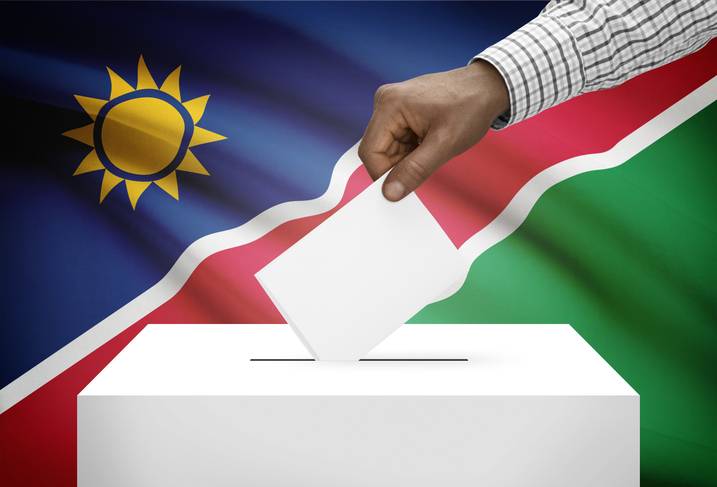
As Namibians head to the polls, the stakes are greater than ever.
Namibia’s election on 27 November is shaping as much as be probably the most fiercely contested in its historical past and, for the primary time, it might result in a second spherical of voting. The election would decide whether or not Swapo, in energy since independence in 1990, retains its dominance or turns into one other former liberation motion to lose its grip on energy.
In The Dialog earlier this month, Henning Melber, a Swapo member and a unprecedented pProfessor of political science on the College of Pretoria, wrote: “Swapo would possibly face defeat for the primary time since independence in 1990.”
He notes that within the 2019 elections, Hage Geingob was re-elected president with the worst consequence ever for Swapo, solely 56%. That is down from 87% in 2014. His erstwhile Swapo comrade, Panduleni Itula, operating for president as an impartial, amassed 30% of the vote.
Now, “Swapo faces a brand new high quality of opposition” in Itula, who based the Unbiased Patriots for Change (IPC) after being expelled from Swapo in 2020. Swapo’s downward development was confirmed by a decline in help within the 2020 regional and native elections, and for the primary time, a transparent victory for Swapo appears much less sure, notes Melber.
Socioeconomic discontent is additional eroding Swapo’s base. Graham Hopwood, the manager director of the Institute for Public Coverage Analysis in Windhoek, notes that there are indications that a lot of the city youth vote is annoyed with the ruling occasion, and their participation on this election might have a robust affect on the end result.
Hopwood believes excessive youth unemployment, almost 50% in 2018, would be the key issue driving younger individuals, particularly the city youth, away from Swapo.
Corruption allegations could have additionally tarnished Swapo’s popularity, particularly for the reason that Fishrot Scandal in November 2019, when a number of authorities officers had been arrested for allegedly accepting bribes to redirect the nation’s fishing quota to an Icelandic fishing firm.
Opposition events equivalent to The Landless Folks’s Motion and the Common Democratic Motion may eat into Swapo’s vote share, having obtained roughly 6.8% of the vote every within the 2020 municipal elections.
Regardless of these difficulties, Swapo will not be completely out of the operating. Fitch Options, a political dangers organisation, expects of their core situation (50% chance) that Swapo will retain its majority within the Nationwide Meeting whereas its candidate, Vice-president Netumbo Nandi-Ndaitwah, will win the presidential race. They cite an Afrobarometer survey launched in June 2024 displaying that 57% of respondents don’t thoughts if the identical occasion (Swapo) continues to control the nation, whereas 39% consider that energy ought to change palms typically.
Namibia’s 2024 presidential election is sure to be a good contest — a win won’t come simply. Swapo is much less more likely to win an outright majority, opposition or impartial candidates are unlikely to move the 50% threshold to win within the first spherical due to the big variety of contenders, and Namibia could face its first-ever run-off election.
Namibia’s president is straight elected by a 50% + 1 vote from the voters. A run-off happens when no candidate will get greater than 50% of the vote within the first spherical — the 2 candidates with the best variety of votes (very probably Nandi-Ndaitwah and Itula) go right into a second spherical of voting till one among them will get a transparent majority.
Swapo’s waning grip on energy, marked by years of declining help, makes a run-off believable. This displays a broader sample throughout Southern Africa, the place liberation events battle to take care of dominance amid fading recollections and rising dissatisfaction, notably amongst youthful voters — the “born free” voters — with no expertise of the liberation battle and who’re looking forward to change.
Robust election 12 months for Southern African liberation events
The once-dominant liberation events of Southern Africa are having a horrible election 12 months, a development that started with the MPLA falling out of favour in Angola’s 2022 election however nonetheless edging out Unita by a small margin.
In South Africa’s basic elections in Could, the ANC fell beneath 50% of the vote for the primary time for the reason that finish of apartheid in 1994 and was compelled to type a authorities of nationwide unity with different events.
Simply final month, the Botswana Democratic Occasion (BDP), which had been in workplace since independence from Britain in 1966, was defeated within the basic elections. It fell from 38 seats to 4 and got here solely fourth in parliamentary seat numbers, conceding energy to the Umbrella for Democratic Change.
In the identical month, the nationwide electoral authority declared an amazing victory for Frelimo and its presidential candidate, Daniel Chapo, after Mozambique’s basic elections. However the opposition mentioned the outcomes had been rigged, declaring the opposition candidate Venâncio Mondlane the winner.
Some impartial observers, together with the Episcopal Convention of Mozambique and the European Union, additionally reported proof of rigging whereas Mondlane unleashed a cascade of protests that safety forces violently dispersed, capturing greater than 30 individuals. Frelimo’s destiny stays unsure — opposition supporters proceed to demand that the federal government depart energy amid violent protests. Even when the occasion stays in energy, its legitimacy and authority could proceed to be questioned.
Now, basic elections method in Namibia, and predictions are divided: the ruling Swapo might lose its absolute majority, following the trail of the ANC or the BDP, or, much less probably, Frelimo — though Swapo may be very more likely to retain its parliamentary dominance.
Alternatively, Swapo could safe the presidency, however it is going to be a hard-fought contest, with its help more likely to additional erode. Regardless of the end result, Namibia’s election this month is ready to be a fiercely contested battle and should properly lead to a second spherical of voting.
Nnaemeka Ohamadike is a senior information analyst at Good Governance Africa.